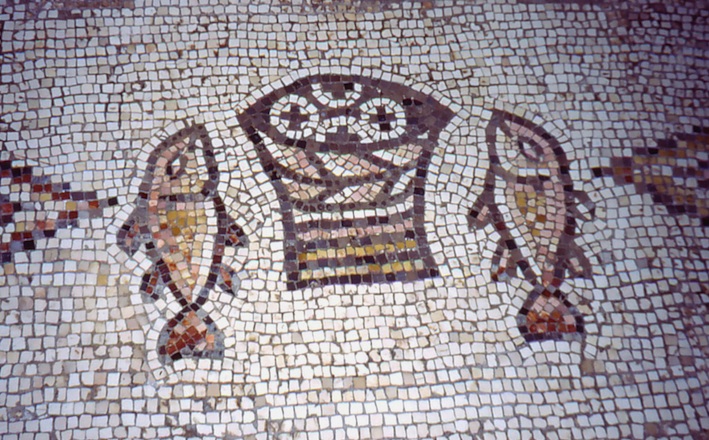Commentary on Isaiah 55:1-5
The prologue to Isaiah in the 14th century Wycliffe Bible asserts that the prophet is …
“not oneli a profete, but more, a Gospellere.”1 In terms of the early Christians’ attempt to understand who this Jesus was in relation to the God of Israel, Isaiah’s poetry played a defining role.2 Indeed, Isaiah is not only a prophet. From the standpoint of the Christian interpreter of Scripture, the prophet was also “Gospellere” — a Good News-er — an evangelist. This particular pericope “languages” the new creation initiated in and through Jesus Christ — a new creation marked not by scarcity but by outrageous abundance and tasted in the Eucharist.
Risking a reach outside of Isaiah for a foil to the vision of Isaiah 55:1-5, recall some of the final words of the Lord to Moses:
Soon you will lie down with your ancestors. Then this people will begin to prostitute themselves to the foreign gods in their midst, the gods of the land into which they are going; they will forsake me, breaking my covenant that I have made with them … For when I have brought them into the land flowing with milk and honey, which I promised on oath to their ancestors, and they have eaten their fill and grown fat, they will turn to other gods and serve them, despising me and breaking my covenant. And when many terrible troubles come upon them, this song will confront them as a witness, because it will not be lost from the mouths of their descendants. For I know what they are inclined to do even now, before I have brought them into the land that I promised them on oath (Deut 31:16, 20-21).3
Such is the situation in which the exiles find themselves. In spite of God fulfilling God’s promise to bring them into the land … in spite of God’s faithfulness to the covenant, they have put their trust in gods other than Yhwh. Against this kind of backdrop, the vision that the prophet paints in Isaiah 55:1-5 serves as an antidote to this idolatry. The text opens with a series of imperatives: Come. Buy. Eat. Listen. Delight. Behold. The list is truly impressive. Note that the vision set out here is not optional. It is imperative. It is Yhwh’s reality into which the hearer is invited. There is not a truly viable alternative. This “everlasting covenant” that Yhwh promises to the people is Yhwh’s promise. This is life.
To the hearer on the edge of exile and in the midst of real displacement from the land which God promised, what is promised here is outrageous. The economy of the promise here reiterated is built not upon the scarcity of exile but upon God’s abundance.
The invitation begins with references to the material: water, wine, milk, bread. These bodily needs are provided. The Lord asks the question: “Why do you spend your money for that which is not bread, and your labor for that which does not satisfy? Listen carefully to me, and eat what is good, and delight yourselves in rich food” (Isaiah 55:2).The outrageous abundance promised opens the way for hearing the promise of a renewed covenant — an everlasting covenant.
Yhwh draws the exiles into the covenant with David4 — “my steadfast, sure love for David” — and expands its boundaries. The “rest from all your enemies” (2 Sam 7:11) promised to David is outrageously redrawn with the everlasting covenant as an irresistible invitation to the nations.
The prophet’s language about the everlasting covenant begins with images of sustenance free and abundant for all: water, milk, wine, bread. This physical sustenance moves outward toward the world. Yhwh’s steadfast, sure love for David expands to welcome those outside, as if there is no inside or outside.
God’s outrageous abundance, the center of the everlasting covenant, spills out of any boundary that anyone might place upon it, promising to fulfill Isaiah’s earlier words: “ … for the earth shall be full of the knowledge of the Lord as the waters cover the sea” (Isaiah 11:9). Also, God’s promise defies commodification. It flies against whatever economic system we might create or abide by. God’s steadfast, sure love is not underwritten by notions of scarcity but works on the principle of abundance that cannot be contained. This is new creation.
And so we return again and again to the Eucharist — to hear God’s Word and to partake of the Lord’s Supper for a foretaste of the new creation. Such is God’s feast of outrageous abundance that exposes our feeble attempts to hoard God’s love, and rather says, “The Body of Christ given for you.” Likewise, from the Gospel according to Isaiah:
Listen carefully to me, and eat what is good, and delight yourselves in rich food. Incline your ear, and come to me; listen, so that you may live. I will make with you an everlasting covenant, my steadfast, sure love for David (Isaiah 55:2b-3).
“Go in peace! Christ is with you!”
Notes:
1 Roughly, “not only a prophet but a Gospel-er.”Cited by John F.A. Sawyer, The Fifth Gospel: Isaiah in the History of Christianity (Cambridge: Cambridge Univ. Press, 1996) 2.
2 Lest the postmodern interpreter doubt this influence, have a look at the quotation, allusion, and verbal parallel lists in the appendices of either the Nestle-Aland or United Bible Society versions of the Greek New Testament.
3 For Moses’song, cf. Deuteronomy 32:1-32, 47.
4 cf. 2 Samuel 7:4-17.


August 3, 2014